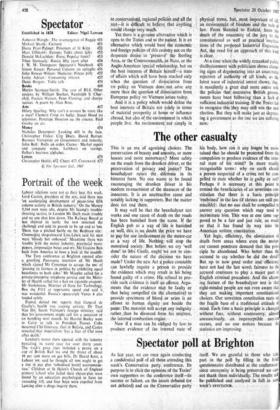Tlw other casualty
This is an era of agonising choices. The • preservation of beauty and amenity; or more - houses and more motorways? More safety • on the roads from the drunken driver, or the preservation of 'privacy and justice? The breathalyser raises the ,..dilemnia in its bitterest form. No one wants to be found encoUraging the drunken driver in his modern re-enactment• of the Massacre of the innocents. It is an unattractive cause and notably lacking in supporters. !But the matter doei not end there.
It may well be that the breathalyser test works and one cause of death on the roads has been banished from the scene. If the English pub as a way of life is banished as well, .this, is;no, doubt the price we have to 'paygor our 'enslavementitn the motor-car as a way of life. Nothing;- will stop the motorised society:: But bef4n!e we cry 'well done'. to:\ Mr ough We not to con- sider the nature of the de4ision we haie made? Under the new Act police constable can lawfully require a person to - provide the evidence which may result in his being found guilty of a crime. Hiis -refusal to pro-- Vide such evidence is itself .ani offence. Argu- ments that the evidence ntaY be faulty or that being compelled (intide alternatiVe) to ' provide specimens of blood Or urine is an affront to, human dignity are beside the point.' The motorist will accept any indignity rather, than ,be divorced from his miStresS, the internal combustion engine. - Now if a man can be obliged by law.;-to produce evidence of the internal state of his body, how can it any longer be main- tained that- he -should be protected from the compulsion to produce evidence of the inter- nal state of his 'mind? In - more readily, recognisable terms: why on' earth should a person suspected of a crime not be com- Relied to state whether he is guilty or not? Perhaps it is -necessary at this point to remind the beneficiaries Of an' unwritten con- stitution that there is a basic principle 'enshrined' in' the law (if shrines are still per- missible): that no one shall be compelled to answer any question which may tend to incriminate him. This was at one time sup- posed to be a fair and just rule, so much so that it has found its way into the American written constitution.
Yet logic, efficiency, the elimination of death from areas where even the motor• car cannot penetrate demand that the prin• ciple be abandoned. Who better than the accused to say whether he did the deed? But up to now good 'order and' efficiency have not had the last word; fairness to the accused continues to play a major part in English criminal, procedure. And the alarm-, ing feature of the breathalyser test is that right-minded people are not even aware that they, are making important constitutional choices. Our unwritten constitution rests on the fragile base of a traditional attitude of mind. Each time a basic principle is changed without fuss, without controversy, almost unconsciously, an imperceptible erosion occurs, and no one notices because the statistics are improving.


































 Previous page
Previous page